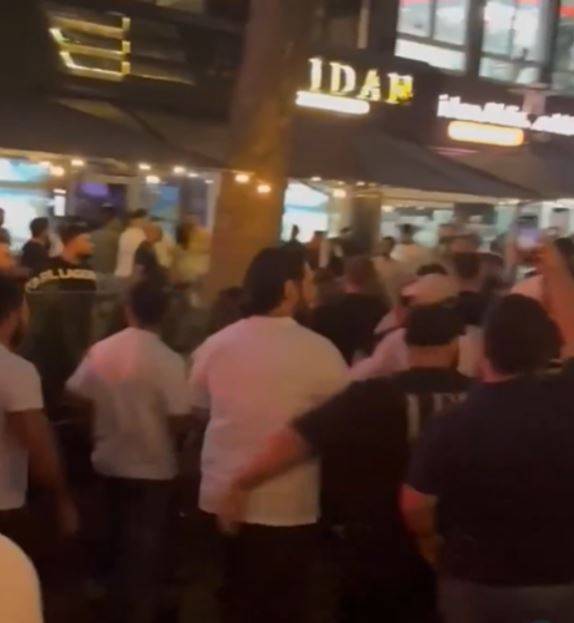
A fight outside a restaurant in Essen, western Germany, on June 16, 2023. (Screenshot MTV)
Tables smashed in a restaurant, shouting, screaming and general panic last Friday in a street in Essen, a city in western Germany. Videos taken at the scene show violent clashes between dozens of Lebanese and Syrians belonging to rival families, in a group brawl that involved around 80 people and left several injured, according to the official German news agency DPA.
German police found iron bars and knives at the scene.
Behind the incident were Mhallamis, mostly Sunni Kurds from southern Turkey who emigrated to Lebanon in the 1930s before moving to Germany. Today they comprise the Lebanese "clans" active in drug trafficking, theft, extortion, prostitution and money laundering in Berlin, Frankfurt, Bremen and Essen, according to Lebanese-born researcher Ralph Ghadban, an expert on the "Arabisches clans" in Germany.
Opposite the Mhallamis were the Syrian clans who arrived in Germany later, including many families from Deir al-Zor in eastern Syria.
Ralph Ghadban explains to L'Orient-Le Jour the origins of these rival clans and the political and economic stakes involved in their rivalries.
Are clashes between Lebanese and Syrian clans such as those we witnessed in Essen unprecedented? Or are they recurring incidents between rival families?
Similar incidents have been taking place between Lebanese and Syrians for several years, ever since the latter began arriving in Germany.
Naturally, the Syrians settled in areas where there were populations of Arab origin, which gave rise to competition between the Lebanese and Syrians for income, particularly from drug trafficking.
Problems between rival families are therefore nothing new, but what is unprecedented is the scale of last Friday's incident in Essen. We've never seen such a confrontation before.
These clashes took place between a Kurdish family from Lebanon [more specifically the Mhallamis] and a Syrian clan from Deir al-Zor. The incident took on enormous proportions, and dozens of Lebanese Sunnis and Shiites in Essen came to the Kurdish family's aid.
The official version is that it was a problem linked to a quarrel between children of the two clans that degenerated into clashes. But according to the unofficial version, the violence started after Syrians harassed a Kurdish woman. It's a question of honor for these families, which is why the fight quickly got out of hand.
Are there political and economic issues at stake in these clan and family rivalries?
The Kurds of Lebanon who settled in Germany are allies of Hezbollah, which explains why Shiites in Essen came to their aid.
The same goes for Lebanese Sunnis, as the Syrians are also their commercial competitors, whether for restaurants or Arab food stores. Similarly, drug sales used to be mainly in Lebanese hands, but the Syrians are now getting in on the action.
I think Friday's brawl will continue to have repercussions and could spread to other towns.
The day after the incident, Syrians ransacked a business belonging to a Kurd. Lebanese retaliated by attacking a Syrian restaurant. Both groups are very angry and tensions are still high.
Which are the best-known Arab clans in Germany?
The big Mhallamis families are well known to the authorities, their names circulating among German police officers. But we're also seeing the emergence of clans from Deir al-Zor, some of whom work as smugglers to Germany and boast about it in videos published online. These smugglers can sometimes earn up to $10,000 per migrant.
In the past, the Mhallamis played a certain role in facilitating the entry of migrants into Europe. But they have been dethroned by the Syrians, who are better placed geographically on the illegal migration route.
When they arrived in Germany, the Mhallamis started extorting money and imposing illegal taxes. They made headlines in this country in 2019, after the theft of jewels and precious stones from a museum in Dresden, the capital of Saxony.